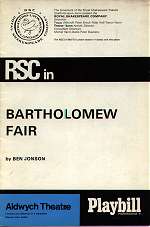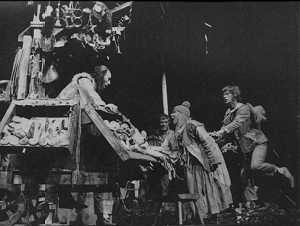
Review / Glasgow Herald / 3.11.69
 |
Review / Glasgow Herald / 3.11.69 |
RSC invokes bitter-sweet memories of the MopI panted a minute or two late into my seat at the Aldwych Theatre last Thursday evening, writes Sheila Bannock, having battled my way through a traffic jam of the most exasperating chaos, to discover that the house lights were still up and that the stage was held by Mr John Kane, who was giving a very clever impersonation of Roy Dotrice as John Aubrey in Brief Lives. He was, in fact, in the role of the Stage Keeper, introducing us to the third professional production in 200 years of Ben Jonson's Bartholomew Fair, directed on this occasion for the RSC by Terry Hands. |
 |
As an "in" joke it is witty enough to be passable, and any Stratfordians who visit the production in the near future, with fresh memories of escorting young innocents with no money sense round Stratford Mop, may also feel a kind of bitter-sweet nostalgia as they follow Alan Howard's Bartholomew Cokes round the bawdy, tawdry, concupiscently colourful, even psychedelic setting of the Bartholomew Fair in Smithfield. But for those, who will presumably be the majority, of the audience unable to make esoteric allusions of this sort, Terry Hands's production of the play suffers, like the streets of London outside, from an attempt to cram too many characters into too small a space without organising them into a pattern.
Ben Jonson himself was somewhat obsessed by what he saw as the pattern of life, a pattern in which the main themes were a lust for power and money, and the pursuits of material ambition by intricate schemings composed of dupery, hypocrisy, and cunning, both high and low. He had a poet's instinct for metaphor and imagery, vivid powers of observation, a mordant sense of fun and a sharp, tart wit.
What he lacked was a real sense of humour, of proportion, of compassion; he seems to have been unable to forgive the sinner for the sin (unlike Shakespeare), and to have been trapped by a certain moral rigidity which he himself might well have been able to satirise if he had been aware of it.
These qualities are perhaps less explicit in Bartholomew Fair than in Jonson's other major plays, though they certainly underlie this excursion into the picaresque. The plot being a gentle little tenuous strand of a thing, the characters have more scope than usual to blossom into detail, eccentric or otherwise. And this is where the director and some of his cast, having, to bend another Jonsonian phrase, being offered a variety of stools upon which to be melancholy, seem to have fallen flat on their faces among them.
The production does not provoke a vivid impression of life in downtown 17th-century London to compare with Mr Hands's suggestion of provincial Windsor in his production of The Merry Wives. Neither is it successfully picaresque because much of the minor characterisation goes undeveloped and even, probably, unseen. But the stage is so full of indistinguishable people and improbable props that the main characters are hard put to it to tell their tale, much less point their morals.
Nevertheless, there are some entertainingly engaging performances which come through the crush more or less unruffled: in particular Alan Howard's gentle, lively, innocent Bartholomew, a performance of most gracefully delicate comedy.
Terence Hardiman plays Littlewit with ever-trusting and hopeful charm, with some very neat and funny gestured asides, and Helen Mirren as Win Littlewit is naively dutiful to all comers and cheerfully amusing at the same time.
Sebastian Shaw as Justice Overdo is content to play on the character's foolishness: from the moment he performs his ludicrous striptease to his discovery of his wife in lascivious pursuit of a lunatic, he loses every trick, without suggesting (as is surely intended) that Overdo himself intended to get the most out of every lewdness he could discover.
Ben Kingsley as Winwife and Norman Rodway as Quarlous are a resourceful and handsomely personable couple of gentlemen about town, and among the fair-people Lila Kaye is tremendous in every sense of the word as a pig woman of the grossest, lewdest enormity. Richard Moore is bouncily brash as Jordan Knockem, the horse courser, and John Kane demonstrates a striking versatility by reappearing in the part of Ezekiel Edgworth, looking like the angelic sprig of a noble household as he might have been painted by a Gainsborough anxious to earn both his patron's esteem and his cash, and behaving with the cheery cunning charm of the Artful Dodger.
Timothy O'Brien's background settings, for no reason that I can think of, are unrelievedly gloomy and grey, and no effort has been spared to make it look tatty. The fairground is more cheerful, but an enormous amount of acting area is taken up by Lantern Leatherhead's stall, a craftily devised polygonal contraption on wheels, with shutters which burst open rather as though they were the petals on an insectivorous plant which had inadvertently swallowed something nasty. (No reflection on Patrick Stewart, as Leatherhead, who determinedly does his utmost to cross the grain of his natural talent to play the part of an indefatigably specious seller of baubles). Among the other improbable props are a supermarket trolley, which carries some of Bartholomew's numerous purchases, and Captain Whit's itinerant bawdy-house, the eviscerated shell of a saloon car of a popular make which has undergone a gaudy respray in a pattern which would render the red rear lights quite superfluous, whatever the pursuing traffic was looking for.
There are many moments when the sharp, perspicuous wit of Jonson is played as it deserves, when his sense of the ludicrous and the hypocritical and the illusory are played with imaginative resource and skill and one feels a real sense of delight at a scene of masterly entertainment. But there are also too many longueurs, partly because, in spite of what the scholars say, Jonson can usually do with a bit of cutting for the stage, but partly also because, in this production, the director's powers of concentration seem occasionally to have flagged.
Sheila Bannock
The Stratford-upon-Avon Herald, 7.11.69.